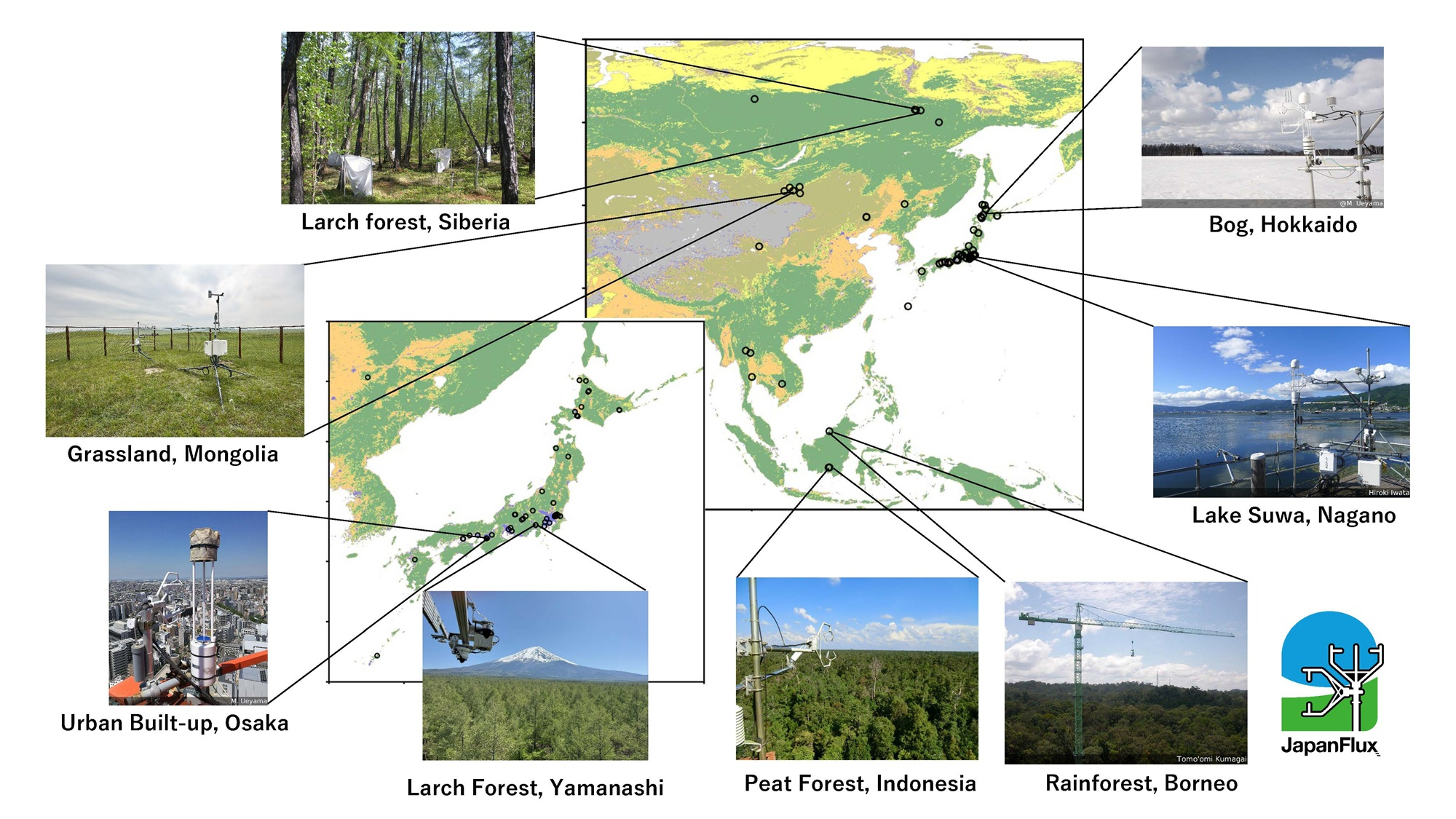Research News
Aug 21, 2025
- Agriculture
Asia steps into the global carbon cycle conversation
JapanFlux2024 compiles 30+ years of eddy covariance data from 83 sites across the region

Observation sites in Japan and neighboring regions
JapanFlux2024 integrates 683 site-years of eddy covariance data collected over 33 years from 83 observation sites across Japan and nearby regions, creating the first large-scale open dataset of its kind in Asia.
Credit: Osaka Metropolitan University
A deeper look into carbon flux is now possible — thanks to a deep pool of scientific collaboration. And for once, the spotlight is on Asia.
Led by researchers at Osaka Metropolitan University, a collaborative team of researchers from Japanese institutions has introduced JapanFlux2024, the first large-scale open dataset of its kind for Asia. It details how terrestrial ecosystems across Japan and neighboring regions absorb and release carbon dioxide (CO2), offering a long-awaited foundation for understanding Asia’s role in the global carbon cycle.
Across Asia’s diverse landscapes—from Siberian taiga to tropical peatlands—terrestrial ecosystems, such as forests and farmland, play a crucial role in regulating the Earth’s climate by acting as both carbon sinks and sources. Understanding these carbon exchanges is essential for tracking the planet’s carbon budget and predicting climate change.
To do so, researchers use the eddy covariance, a technique that provides real-time, long-term measurements of carbon, water, and energy fluxes between the land and the atmosphere. Whilst large observation datasets exist for Europe and North America, Asia has remained underrepresented.
“Although observations have been conducted in Asia for many years, the lack of standardized data has left key uncertainties in evaluating the region’s carbon uptake,” said Masahito Ueyama, an associate professor at Osaka Metropolitan University’s Graduate School of Agriculture.
To close this gap, the team compiled JapanFlux2024, integrating 683 site-years of eddy covariance data collected from 83 locations between 1990 and 2023, covering ecosystems in Japan as well as in China, Russia, Mongolia and Southeast Asia.
“We are proud to share the results of over three decades of collaborative field research,” Ueyama said.
Data from JapanFlux2024 follows international FLUXNET processing standards, with region-specific adaptations. FLUXNET is a global network of standardized eddy observation sites used to study how ecosystems respond to environmental changes.
JapanFlux2024 provides high-quality information on CO2 fluxes, sensible and latent heat at half-hour intervals, thereby offering valuable insights for environmental monitoring, climate modeling and remote sensing applications.
“We hope JapanFlux2024 will greatly assist efforts to achieve carbon neutrality, improve land-use strategies, and enhance policy-relevant climate science in Japan and the broader Asia-Pacific region,” Ueyama said.
Funding
KAKENHI (18H03362, 24K03065, 25450201, 22H05711, 22H05004, 24H01504, 17H05039, 21H02315, 23K21248, 23KK0194, 15K01159, 20H01384, 23K20125, 20H0309, 21H05316, 21H05312, 19H03301, 18780113, 21241009, 22248017, 23710005, 24241008, 26241005, 26292092, 15H04512, 20H03041, 20K06144, 21H02245, 21H05316, 23K11395, 24K01818, 24K00986, 24241008, 24310017, 15H02814, 18H03365, 19H01975, 22H00564, 22H05006, 16K07789, 11213204, 14656059, 16208014, 2331001513, 2529207903, 19H03077, 19H03085, 23H02341, 25304027, 16H02762, 21H02238, 22K05752, 24H01520)
PAWCs project under KAKENHI (19H05668)
JSPS A3 Foresight Program Number (JPJSA3F20220002)
Arctic Challenge for Sustainability II (ArCS II; JPMXD1420318865)
Environment Research and Technology Development Fund (JPMEERF24S12207, JPMEERF20232M01)
Environment Research and Technology Development Fund (S-1)
Global Environment Research Coordination System from the Ministry of the Environment, Japan MAFF2254, MAFF0751, MAFF1251, MAFF2254
Global Environment Research Fund of the Ministry of the Environment, Japan S‐1: Integrated Study for Terrestrial Carbon Management of Asia in the 21st Century Based on Scientific Advancement
Research revolution 2002: Global Warming Initiatives (FY2002-2006) by the Ministry of Education, Culture, Sports, Science and Technology of Japan
Commissioned project study from the Ministry of Agriculture, Forestry and Fisheries (JPJ005317)
Research Coordination System (MAFF0751, 1251, 2254) from the Ministry of the Environment of Japan
Research grants (#199903, #200303, #201802) from the Forestry and Forest Products Research Institute
Ministry of the Environment (0708BD437, D-0909)
Project “Development of technologies for mitigation and adaptation to climate change in agriculture, forestry and fisheries” by the Ministry of Agriculture, Forestry and Fisheries of Japan
Project “Study of biogeochemical cycles and adaptive reactions of plants of boreal and arctic ecosystems of northeastern Russia” (AAAA-A21-121012190034-2) of the Ministry of Education and Science of Russia
Paper Information
Journal: Earth System Science Data
Title: The JapanFlux2024 dataset for eddy covariance observations covering Japan and East Asia from 1990 to 2023
DOI: 10.5194/essd-17-3807-2025
Author: Masahito Ueyama, Yuta Takao, Hiromi Yazawa, Makiko Tanaka, Hironori Yabuki, Tomo’omi Kumagai, Hiroki Iwata, Md. Abdul Awal, Mingyuan Du, Yoshinobu Harazono, Yoshiaki Hata, Takashi Hirano, Tsutom Hiura, Reiko Ide, Sachinobu Ishida, Mamoru Ishikawa, Kenzo Kitamura, Yuji Kominami, Shujiro Komiya, Ayumi Kotani, Yuta Inoue, Takashi Machimura, Kazuho Matsumoto, Yojiro Matsuura, Yasuko Mizoguchi, Shohei Murayama, Hirohiko Nagano, Taro Nakai, Tatsuro Nakaji, Ko Nakaya, Shinjiro Ohkubo, Takeshi Ohta, Keisuke Ono, Taku M. Saitoh, Ayaka Sakabe, Takanori Shimizu, Seiji Shimoda, Michiaki Sugita, Kentaro Takagi, Yoshiyuki Takahashi, Naoya Takamura, Satoru Takanashi, Takahiro Takimoto, Yukio Yasuda, Qinxue Wang, Jun Asanuma, Hideo Hasegawa, Tetsuya Hiyama, Yoshihiro Iijima, Shigeyuki Ishidoya, Masayuki Itoh, Tomomichi Kato, Hiroaki Kondo, Yoshiko Kosugi, Tomonori Kume, Takahisa Maeda, Shoji Matsuura, Trofim Maximov, Takafumi Miyama, Ryo Moriwaki, Hiroyuki Muraoka, Roman Petrov, Jun Suzuki, Shingo Taniguchi, & Kazuhito Ichii
Published: 21 August 2025
URL: https://doi.org/10.5194/essd-17-3807-2025
Contact
Masahito Ueyama
Graduate School of Agriculture
Email: mueyamaa[at]omu.ac.jp
*Please change [at] to @.
SDGs

